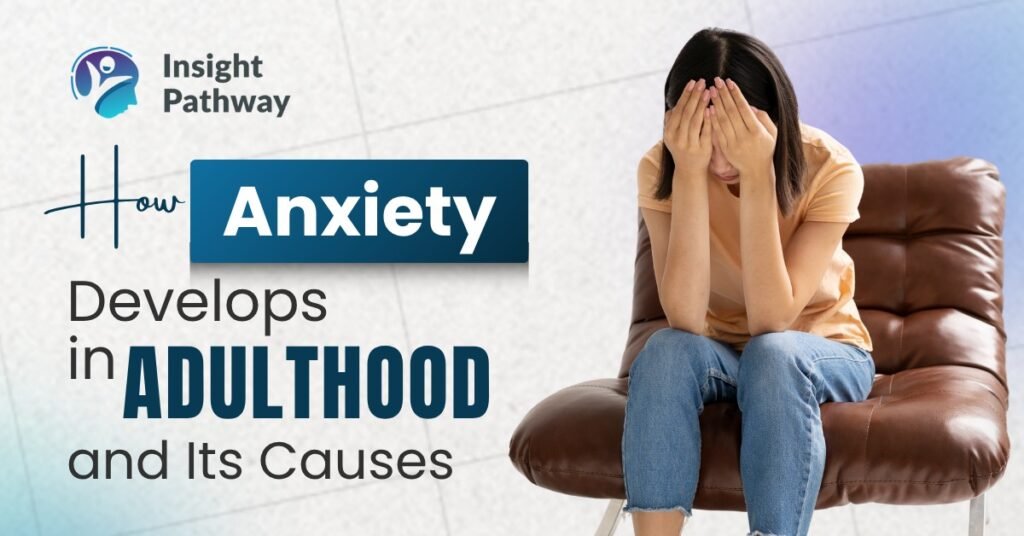Anxiety is a common yet often misunderstood mental health issue that affects millions of adults worldwide. While it’s normal to feel anxious in stressful situations, persistent anxiety can interfere with daily functioning, relationships, and overall well-being. Understanding how anxiety develops in adulthood is crucial for both early detection and effective intervention.
Adult anxiety doesn’t typically emerge overnight. For many people, it builds slowly over time, often triggered by ongoing stress, unresolved trauma, or significant life changes. The good news is that anxiety can be effectively treated, and the first step to recovery is identifying its underlying causes.

The Rise of Adult Anxiety
Today’s fast-paced, high-pressure lifestyle contributes significantly to adult anxiety. From managing work deadlines and financial obligations to navigating family responsibilities and social expectations, adults face constant demands on their time and energy. These pressures can lead to chronic stress, which, if left unchecked, may develop into anxiety.
Unlike childhood anxiety, which often stems from fears of abandonment or external dangers, anxiety in adults tends to revolve around internal concerns. These might include fears about the future, feelings of inadequacy, or a constant worry about making the wrong decisions.
Causes of Anxiety in Adults
There are several known causes of anxiety in adults, and often, multiple factors are at play. Identifying these causes can help individuals understand their own experiences and take meaningful steps toward healing.
1. Long-term Stress
Chronic stress is one of the most common contributors to adult anxiety. Whether it’s work-related pressure, financial strain, or caregiving responsibilities, prolonged stress affects the nervous system, making it more reactive over time. Eventually, the body starts to stay in a heightened state of alertness, which can trigger ongoing anxiety.
2. Life Transitions
Significant life events can be overwhelming, including starting a new career, relocating to a new place, getting married, getting divorced, or having children. Even positive changes can disrupt a person’s emotional balance and lead to heightened anxiety.
3. Unresolved Childhood Trauma
Traumatic experiences during childhood—such as abuse, neglect, or household instability—can shape a person’s emotional development. These early wounds often remain unhealed and resurface in adulthood, affecting relationships, self-esteem, and the ability to handle stress. This is a major reason why anxiety develops in adulthood for many individuals.
4. Biological and Genetic Influences
Anxiety is more physiologically prone to some people than others. You may be at higher risk if a family member suffers from an anxiety disorder or another mental illness. Anxiety symptoms can also be exacerbated by abnormalities in brain neurotransmitters such as dopamine and serotonin.
5. Poor Lifestyle Habits
Sleep deprivation, unhealthy eating, lack of exercise, and substance use can all negatively impact mental health. Adults who consume high levels of caffeine, smoke frequently, or drink alcohol to cope with stress are more likely to experience anxiety. These habits not only affect physical well-being but also disrupt emotional regulation.
6. Medical Conditions
Sometimes, anxiety is a symptom of an underlying medical issue. Thyroid problems, heart arrhythmias, and certain neurological conditions can all cause physical sensations that mimic anxiety, such as rapid heartbeat, dizziness, or breathlessness.
Common Symptoms of Adult Anxiety
Recognizing anxiety symptoms is essential for seeking appropriate help. While anxiety manifests differently for each person, there are several telltale signs:
-
Constant worry or fear that feels difficult to control
-
Physical symptoms like muscle tension, headaches, or digestive issues
-
Trouble sleeping or staying asleep
-
Difficulty concentrating or feeling mentally “foggy”
-
Panic attacks or sudden feelings of overwhelming fear
-
Avoidance of social situations or stressful tasks
-
Irritability and restlessness
These symptoms may come and go or persist over weeks and months. Many adults dismiss them as just stress, but when anxiety begins to interfere with your work, relationships, or personal growth, it’s time to take it seriously.
Why It’s Important to Understand How Anxiety Develops in Adulthood
Many people believe anxiety only affects children or teens. In reality, adult anxiety is incredibly common and can be just as debilitating. When left untreated, anxiety can lead to depression, substance misuse, or chronic health problems.
By understanding how anxiety develops in adulthood, we become better equipped to respond with empathy and action—both for ourselves and for others who might be struggling. It also allows healthcare providers, employers, and families to offer the right kind of support.
Strategies for Managing Anxiety
Fortunately, adult anxiety is manageable with the right strategies and support. Here are a few effective ways to reduce anxiety and build emotional resilience:
1. Cognitive Behavioral Therapy (CBT)
CBT is a widely used, evidence-based treatment that helps individuals identify and reframe negative thought patterns. It’s especially helpful in understanding the triggers of anxiety and learning healthier coping skills.
2. Lifestyle Changes
Simple but consistent changes like getting enough sleep, eating balanced meals, staying active, and limiting caffeine can improve both physical and mental health. Regular exercise, in particular, helps regulate stress hormones and boosts mood.
3. Mindfulness and Meditation
Mindfulness practices, such as breathing exercises and body scans, help anchor you to the present moment. These techniques reduce mental chatter and train the brain to respond more calmly to stress.
4. Professional Support
Working with a therapist or counselor can provide insight and tools tailored to your specific needs. In some cases, medication may also be recommended to help balance brain chemistry and ease symptoms.
5. Building a Support Network
Talking to friends, family, or support groups can reduce the sense of isolation that often accompanies anxiety. Sharing your experience with trusted individuals fosters connection and makes the journey feel less overwhelming.
Conclusion
Anxiety is more than just occasional worry—it’s a condition that can deeply affect the quality of adult life if not addressed. Understanding how anxiety develops in adulthood helps us break the stigma, recognize early warning signs, and take action. Whether the causes stem from past trauma, lifestyle, or genetics, anxiety is both real and treatable.
If you’re struggling, you’re not alone. The first step is awareness—the second is knowing that support is available. With time, care, and the right resources, it’s possible to manage anxiety and live a balanced, fulfilling life.


